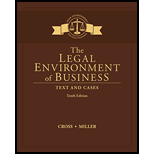
Case summary: Person TP and person JN were two partners of a firm SI. JN offered to buy the shares of TP to which he agreed. Later, TP found that JN concealed the fact of the invention of a new product during negotiations and brought a suit against him on the grounds of fraud and other claims.
To find: Liability of SI in the above case.
Case summary: TP and JN were two partners of a firm SI. JN offered to buy the shares of TP to which he agreed. Later, TP found that JN concealed the fact of the invention of a new product during negotiations and brought a suit against him on the grounds of fraud and other claims.
To find: Liability of SI in the above case.
Trending nowThis is a popular solution!

Chapter 18 Solutions
The Legal Environment of Business: Text and Cases (MindTap Course List)
- ETHICS Pete, an accountant, recommended that several of his clients invest in Competition Aircraft. These clients passed this recommendation on to Arlene, who did invest. Unfortunately, Competition was a fraudulent company that pretended to sell airplanes. After the company went bankrupt, she sought to recover from Pete. Is Pete liable to Arlene? Whether or not Pete faces legal liability, is it a good idea for accountants to recommend investments to clients? Does that practice create any potential conflicts of interest?arrow_forwardDuring the course of an engagement, you and a junior consultant discover illegal payments, fraud and other questionable management practices. The client is a large publicly held corporation. Shortly after the discovery, the junior consultant makes the following comment; "We're here as a confidential counselors and have been made privy to innermost secrets by a client who has been completely open. What rights do we have to tell him what's right and wrong? Do we have to be policemen as well as father confessors?" What response should you make to this comment?arrow_forwardSue is a fifty-five year old employee of company A. Her children are out of college and her parents have both died. Company A offers a child care program to all employees along with an elder care program. However, Sue, like many other employees, has no need for these services, neither now or in the future. Should the firm retain these programs? Should alternative benefits for employees who have no use for such services be offered?arrow_forward
- Franchising is a business plan in which an owner (franchisor) permits a free operator (franchisee) to utilize its laid-out brand, items, benefits, and working framework in return for different charges, royalties, or continuous help. This plan empowers the franchisee to work their own business under the franchisor's laid-out brand and take advantage of its demonstrated plan of action, while the franchisor extends its image presence and gathers fees and royalties. Franchising is a typical technique for business development and can be tracked down in different ventures, including drive-through eateries, retail, auto, and numerous others. Type and Model of Franchise: When considering franchising your business, it's crucial to determine the type and model that best suits your business and its goals. There are several types and models to consider: a. Business Arrangement Establishment: Justification: This model is great on the off chance that you have a clear-cut business idea with a…arrow_forwardRichard Potter expresses concerns about the ethical conduct of his previous tax advisors and asks how he can be confident to trust the advice and conduct of yourself, and the other tax professionals working for ‘XXX UK Ltd'. Required: Briefly explain the role a “Professional Code of Conduct” plays in the tax profession and explain TWO fundamental principles you would comply with whilst advising Theo.arrow_forwardStephen Glass made himself infamous as a dishonest journalist by fabricating material for more than forty articles for The New Republic and other publications. At the time, he was a law student at Georgetown University. Once suspicions were aroused, Glass tried to avoid detection. Later, Glass applied for admission to the California bar. The California Supreme Court denied his application, citing “numerous instances of dishonesty” during his “rehabilitation” following the exposure of his misdeeds. How do these circumstances underscore the importance of ethics?arrow_forward
 BUSN 11 Introduction to Business Student EditionBusinessISBN:9781337407137Author:KellyPublisher:Cengage Learning
BUSN 11 Introduction to Business Student EditionBusinessISBN:9781337407137Author:KellyPublisher:Cengage Learning Essentials of Business Communication (MindTap Cou...BusinessISBN:9781337386494Author:Mary Ellen Guffey, Dana LoewyPublisher:Cengage Learning
Essentials of Business Communication (MindTap Cou...BusinessISBN:9781337386494Author:Mary Ellen Guffey, Dana LoewyPublisher:Cengage Learning Accounting Information Systems (14th Edition)BusinessISBN:9780134474021Author:Marshall B. Romney, Paul J. SteinbartPublisher:PEARSON
Accounting Information Systems (14th Edition)BusinessISBN:9780134474021Author:Marshall B. Romney, Paul J. SteinbartPublisher:PEARSON
 International Business: Competing in the Global M...BusinessISBN:9781259929441Author:Charles W. L. Hill Dr, G. Tomas M. HultPublisher:McGraw-Hill Education
International Business: Competing in the Global M...BusinessISBN:9781259929441Author:Charles W. L. Hill Dr, G. Tomas M. HultPublisher:McGraw-Hill Education





